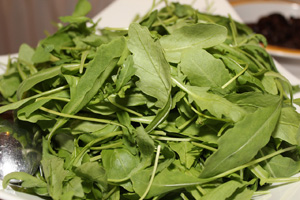
Every day, my breakfast is topped with curry powder, which contains turmeric, which is bitter. I must have my coffee in the morning. For lunch I usually eat a salad containing arugula and radishes. I love using fresh herbs from my garden, such as parsley, basil and cilantro. And I’d love to eat dark chocolate every day, but I resist that.
All of the foods I mentioned are bitter, so I must be a sociopath.
Researchers from the University of Innsbruck in Austria say that they’ve found an association between people who say they like bitter foods and antisocial personality traits.
According to reports on Science Direct and Medical Daily, almost 1,000 people all Americans were handed long lists of foods and asked how much they liked them. (Apparently nobody ate any food for this research.)
The research subjects were given a battery of self-report personality questionnaires to assess Machiavellianism, psychopathy, narcissism, everyday sadism, trait aggression and the Big Five personality factors.
Then the researchers ran a statistical analysis and found a correlation. They wrote:
“The results of both studies confirmed the hypothesis that bitter taste preferences are positively associated with malevolent personality traits, with the most robust relation to everyday sadism and psychopathy.”
I wonder if the researchers considered the possibility that people with malevolent personality traits may still be concerned about their health? Because apparently, eating bitter foods is good for you.
According to the Nature’s Sunshine blog, some of the best herbalists in the world say that eating bitter foods creates a chemical reaction in our bodies that has numerous health benefits. Among the foods we should eat should eat, according to the author, are:
- Kale
- Dark chocolate
- Coffee
- Dill
- Sesame
- Dandelion
- Horseradish
- Watercress
- Parsley
- Radish
- Aloe
- Cilantro
- Arugula
- Bitter melon and gourd
- Japanese eggplant
- Turmeric
- Leafy greens
- Barley
- Basil
- Jicama
- Lettuce
- Chamomile
Here is the article, along with a slideshow that also extols the virtues of bitter foods:
5 reasons why you should eat bitter foods and herbs, on Blog.NaturesSunshine.com.
10 bitter foods that cleanse the body and boost performance, on Active.com.
So I’m having a hard time taking seriously the research about a link between liking bitter foods an antisocial personality traits. If you want to read what the researchers say, here are some articles about the studies.
Individual differences in bitter taste preferences are associated with antisocial personality traits, on ScienceDirect.com.
Personality traits and eating habits: Enjoying bitter foods linked to the ‘dark triad,’ on MedicalDaily.com.
Story suggested by a Lovefraud reader.




































 7 reasons loving a cheater can be a gift
7 reasons loving a cheater can be a gift
Canuck
Have to wonder about all the preferences attributed to sociopathy.
Some preferences do make sense though. Inflicting pain or getting enjoyment from viewing it I imagine would be right up there. Exploiting others for one’s gain was also mentioned on this site.
Thomas Sheridan states that females without crows feet (after a certain age) are sociopaths. Most of my life I have not smiled therefore do not have crows feet. Had a issue about showing my teeth when I was growing up and after getting them fixed not smiling was normal for me.
I believe I am not a sociopath because it pains me horribly to see suffering and I can feel the happiness of other beings. Their happiness brings me emotional warmth and joy. Those to whom another’s happiness is contagious I believe are far from being psychopaths. There are so many lists for psychopathy, wish a list that ruled out psychopathy would be created.
I beieve that when one’s life has been influenced by sociopaths mainly one does continuously look for signs of sociopathy in oneself, a mental check to make sure we are still human and have not reverted to becoming the monsters our gene donors are. Therefore I think the questionable traits and preferences attributed to sociopathy may be harmful for those who were hurt by sociopaths. We end up protesting too much and not because we are sociopaths.
Delores
An intelligent response to an otherwise silly article. Thanks. You made it worth coming to read it and I doubt there is a single living person who does not have a few of the traits attributed to psychopaths. In fact some of the traits are actually good in moderation and with empathy. The traits are jut traits, the real evil is the lack of empathy and enjoyment of hurting others.
Donna Andersen
Not having crow’s feet means you’re a sociopath? That’s ludicrous.
Does it also mean everyone who uses botox is a sociopath?
Canuck
Thank you Donna.
There can be many reasons why we like some bitter foods and have woken up in a sweat. Yes that is listed as the trait of a psychopath.
I had pneumonia and my mind immediately jumped to reading that waking up in a sweat is a sign of being psycopathic. Crazy making lists because we do not want to become our twisted parents.
To make up for the many lists that so easily label people we need a list of traits which definitely 100% cancel out the possibility of being a sociopath?
Getting paid to work with the vulnerable does not necessarily count because in some cases it is like paying the fox to feast in the henhouse. Have personally witnessed unimaginable cruelty towards the weaker recipients from those in power (cowards) whom noone would question because of their do good persona. These people very quickly rise in the helping professions. In my attempts to understand and cancel out any possibility of taking on pscopathic traits I gravitated toward volunteering and eventually working as a Community Advocate so have witnesssed the unbelievable. Sorry for the long rant.
AnnettePK
My ex spath had no sense of smell, which has been linked to sociopathy. Smells are processed in the same areas of the brain that processes certain emotions. His taste for foods sometimes seemed unusual, possibly due to the role that smell plays in tasting food.
It’s possible that in the sample tested there was a preference for certain types of foods due to a deficit in the senses of smell and taste, or some other brain abnormality.
I like bitter food (and bitter beer!). I’m not offended by the study results. I probably have a trait or two on the psychopath checklist, too, but not enough of them to classify me as a spath.
If a study shows that people with limps prefer a certain type of shoe, that doesn’t mean that some people without limps will not also prefer that type of shoe. The occurrence in the population won’t be significant, as more factors determine the shoe type preference in the general population.
The usefulness of the study results would be in combination with other traits to identify a sociopath. Most important, it may help provide a clue in eventually determining a physical basis of sociopathy.
AnnettePK
I’m not sure I see the relationship between the health benefit of certain foods identified as bitter (were these the same foods used in the study?), and a possible link between sociopathic traits and taste preference. It doesn’t mean that anyone who likes bitters is a sociopath. It indicates a higher than normal percentage in a certain population.
sarahlf
The research may not be so silly–even if it doesn’t fit you.
Those bitter foods listed have a lot of common vitamins, minerals and food chemicals in common such as folates (B vitamins) and copper.
There is a lot of research regarding pyschopathy and genetic and epigentic disorders leading to either excess or deficiencies in copper and particular b vitamins. Either way–excess or deficiencies–can create chemical imbalances that lead to either temporary psychopathy or affect brain development that reinforces such traits.
Better to go to the sources and learn about nutritional imbalances and their link with psychopathic traits at Mensah Medical’s website–see resources. This is particularly helpful for the children of such parents as these chemical imbalances are treatable–and without drugs in some cases. See their webinars to learn about methylation and pyroluria.
AnnettePK
Thanks for sharing. Like other traits (such as alcoholism), psychopathy likely has a physical component as well as a character of choice component. Science has just begun to scratch the surface, and there will probably be various conjectures and theories before more is understood.